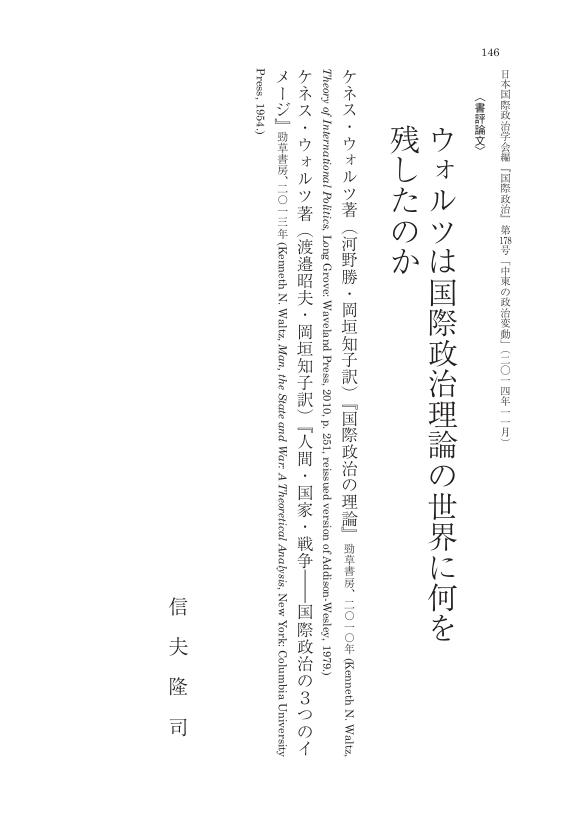9 0 0 0 IR ウォルツの国際政治理論
- 著者
- 信夫 隆司
- 出版者
- 岩手県立大学総合政策学会
- 雑誌
- 総合政策 = Journal of policy studies (ISSN:13446347)
- 巻号頁・発行日
- vol.4, no.2, pp.153-184, 2003-09-30
米国の国際政治学者、ケネス・ウォルツの国際政治理論は、現代国際政治理論の原点に位置づけられる。ウォルツのネオリアリズム(あるいは、構造的リアリズム)は、国際政治を構造という視点から科学的に理解しようとした初めての試みである。しかし、かれの理論は、国家の能力という物質的な意味合いを重視し、その結果、冷戦の終焉を十分に説明しているとはいえない。そこで、本稿では、あらためて、ウォルツのネオリアリズムの全体像を批判的に検討し、その上で、エージェント-構造問題という視点からウォルツ理論を整理しなおした。それにより、ウォルツ理論は、構造がエージェントに及ぼす影響のみを重視しすぎ・エージェントならびにその相互作用の分析が欠けていることが明らかになった。Kenneth Waltz, a U.S. scholar of international politics, is positioned at the starting point of contemporary international political theories. Waltz's neorealism (or structural realism) is the first attempt to understand international politics scientifically from the perspective of international structure. However, his theory makes too much of the distribution of material implications called national capability, and, as a result, it does not fully cover the end of the Cold War. Therefore, this paper critically examines the total image of Waltz's neorealism and rearranges it from the agent-structure perspective. As a result, it became clear that Waltz's theory made too much of structure's influence on agents, and lacked analysis of agents and their interactions.
5 0 0 0 OA 国際政治理論の系譜 : ウォルツ、コヘイン、ウェントを中心として
- 著者
- 信夫 隆司
- 出版者
- 岩手県立大学
- 雑誌
- 総合政策 (ISSN:13446347)
- 巻号頁・発行日
- vol.5, no.2, pp.243-265, 2004-02-10
本稿は、1970年代終わりから今日までの国際政治理論の系譜を探ることを目的とした。本稿で、主として取り上げた国際政治理論は、ケネス・ウォルツのネオリアリズム、ロバート・コヘインの国際制度論、アレクサンダー・ウェントのコンストラクティヴィズムである。これらの国際政治理論について、存在論と認識論という視点から新たな分析を試み、その上で、アナーキーと国家のインタレストのとらえ方について言及した。
3 0 0 0 OA ウォルツは国際政治理論の世界に何を残したのか
- 著者
- 信夫 隆司
- 出版者
- 一般財団法人 日本国際政治学会
- 雑誌
- 国際政治 (ISSN:04542215)
- 巻号頁・発行日
- vol.2014, no.178, pp.178_146-178_155, 2014-11-10 (Released:2015-11-30)
- 参考文献数
- 27
2 0 0 0 OA 中村房次郎と松尾鉱山
- 著者
- 信夫 隆司
- 雑誌
- 総合政策 = Journal of policy studies (ISSN:13446347)
- 巻号頁・発行日
- vol.3, no.1, pp.43-90, 2001-07-01
松尾鉱山は、かつて、東洋一の硫黄鉱山であるとか、「雲上の楽園」と言われた。閉山からすでに30年以上が経過し、松尾鉱山の栄華を知る人も数少なくなってきている。今日では、松尾鉱山から出る強酸性の坑廃水の処理問題だけに関心が行き勝ちである。しかし、この問題が登場する背景をわれわれはきちんと理解しておく必要がある。そのため、本稿では、1914(大正3)年に松尾鉱業が創立される由来にまで遡り、松尾鉱山の歴史を紐解いてみた。また、松尾鉱山の生みの親である松尾鉱業初代社長中村房次郎の事跡をたどりながら、第2次世界大戦までの30年あまりにわたる松尾鉱山の歩みを跡づけた。
2 0 0 0 OA NATO軍地位協定の民事請求権―日米地位協定のルーツを訪ねて―
- 著者
- 信夫 隆司
- 出版者
- 岩手県立大学総合政策学会
- 雑誌
- 岩手県立大学総合政策学会 Working Papers Series
- 巻号頁・発行日
- no.159, pp.1-54, 2022-08-29
2 0 0 0 OA 核持ち込みの事前協議をめぐる日米交渉
- 著者
- 信夫 隆司
- 出版者
- 日本大学
- 雑誌
- 政経研究 (ISSN:02874903)
- 巻号頁・発行日
- vol.49, no.4, pp.71-118, 2013-03-05
1 0 0 0 小笠原返還における核持ち込み問題
- 著者
- 信夫 隆司
- 出版者
- 日本大学政経研究所
- 雑誌
- 政経研究 = Studies in Political Science and Economics (ISSN:02874903)
- 巻号頁・発行日
- vol.54, no.2, pp.131-171, 2017-09
1 0 0 0 OA 在京米大使館のインテリジェンス活動と対日政策決定への影響の政治史的分析
1 0 0 0 OA 中村房次郎と松尾鉱山
- 著者
- 信夫 隆司
- 出版者
- 岩手県立大学
- 雑誌
- 総合政策 (ISSN:13446347)
- 巻号頁・発行日
- vol.3, no.1, pp.43-90, 2001-07-01
松尾鉱山は、かつて、東洋一の硫黄鉱山であるとか、「雲上の楽園」と言われた。閉山からすでに30年以上が経過し、松尾鉱山の栄華を知る人も数少なくなってきている。今日では、松尾鉱山から出る強酸性の坑廃水の処理問題だけに関心が行き勝ちである。しかし、この問題が登場する背景をわれわれはきちんと理解しておく必要がある。そのため、本稿では、1914(大正3)年に松尾鉱業が創立される由来にまで遡り、松尾鉱山の歴史を紐解いてみた。また、松尾鉱山の生みの親である松尾鉱業初代社長中村房次郎の事跡をたどりながら、第2次世界大戦までの30年あまりにわたる松尾鉱山の歩みを跡づけた。



